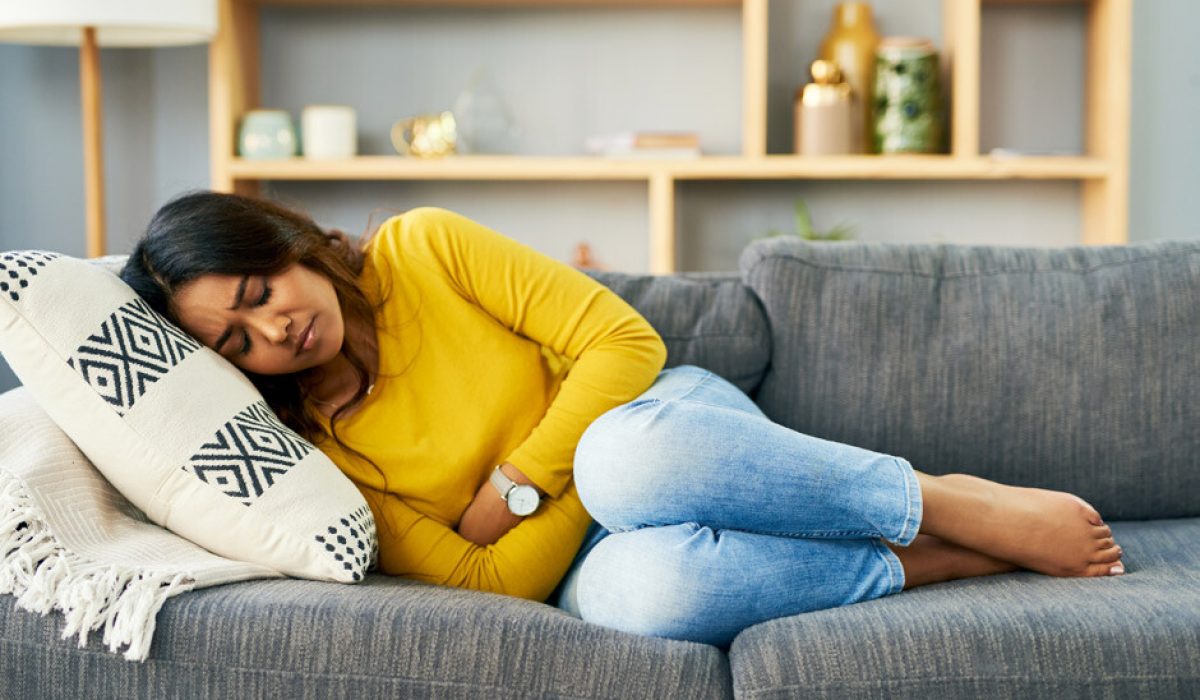If you suffer significant period pain every month, you may be left worrying what painful periods mean. It’s a key question to ask, because although most women will experience period pain and it’s nothing to worry about, sometimes what painful periods mean is that there is an underlying gynaecological problem. So what should you look out for? Let’s break it down.
What should period pain feel like?
Most women will suffer some period pain in their lives, but what should period pain feel like? It’s most often experienced as tummy cramps, but the sensation can spread to the back and thighs. It may be a dull, constant ache, or it may present as strong spasms, or both. Menstrual cramps can vary from period to period, with some months more painful than others. Sometimes period pain changes depending on how many days into your period you are.
However, it’s best to see a doctor when period pain is very severe, changes markedly, and/or you notice other symptoms such as:
- Pain or bleeding after sex
- Nausea and/or diarrhoea on your period
- Pain during sex
- Frequent need to pass water
- Bleeding between periods
- Pain during urination
- Foul-smelling or green/yellow discharge
This is because these symptoms could signal an underlying gynaecological problem (see below).
Why are my period pains so painful?
Period pain occurs when the muscles of the uterus (womb) wall contract, to help shed the uterine lining as part of your menstrual process. These contractions squeeze the blood vessels that line the womb, temporarily suspending the blood and oxygen supply to the uterus. This lack of oxygen triggers the uterine tissues to secrete chemicals that set off pain. As this happens, your uterus generates other chemicals named prostaglandins, which prompt the uterine muscles to contract more, creating further discomfort.
Why do some women suffer worse period pain than others? It could be because some women have an accumulation of prostaglandins, creating more powerful contractions.
Some women also experience a worsening of period pain because of an IUD (contraceptive coil).
In some cases, painful periods can be a sign of a gynaecological problem, for instance endometriosis or pelvic inflammatory disease. See below for more information.
Do periods get worse with age?
When they reach their forties, most women begin to experience perimenopausal hormonal changes, in the run-up to the menopause which often occurs in a woman’s fifties. During perimenopause, many women experience irregular periods, lighter or heavier flow, or spotting in between periods. And oestrogen levels often climb in perimenopause, which can prompt the womb to issue more prostaglandin, which may result in more severe period pain.
Then there is the issue of period pain associated with an underlying gynaecological issue. You are less likely to experience period pain associated with a medical problem when you are young. Women between the ages of 30 to 45 are the most likely to experience this.
So in short, while experience certainly varies from woman to woman, it is not uncommon for women to experience more difficult periods when they are older.
Here at The Gynae Centre, we are one of the UK’s leading clinics for expert menopause treatment. We can provide treatment for hormonal changes that will help you feel like yourself again. And with decades of experience in successfully and swiftly treating the gynaecological issues that can lead to particularly painful periods and abnormal bleeding, we are a one stop shop for gynae diagnosis and treatment. If there is a problem, we will find it and treat it swiftly.
When painful periods mean there is a gynaecological problem
In some cases, what painful periods mean is that there is an underlying medical problem to be addressed. Such problems include:
- Endometriosis – This is when tissue that usually lines the uterus (endometrial tissue) grows outside of the womb where it is not meant to, for example in the ovaries or fallopian tubes. Like the lining inside the womb, this tissue thickens and sheds but it cannot escape during your period. Endometriosis tends to cause intense pelvic pain, and the pain is usually not just confined to your monthly period. Other possible symptoms include pain going to the toilet during your period, nausea, diarrhoea or constipation while on your period, and discomfort during or following sexual intercourse. Endometriosis can make it more difficult to get pregnant, and if you suspect you may have it, it’s advisable to see a gynaecologist.
- Adenomyosis – This is when endometrial tissue grows into the uterus’ muscular wall, making it thicker and warping the blood vessels. This often leads to heavy, long, and incredibly painful periods. It can also create pain during sexual intercourse and is linked to fertility issues.
- Uterine fibroids – These are non-cancerous tumours made of muscle and fibrous tissue, that can develop inside or around the uterus. If you have fibroids, in addition to heavy and/or painful periods you may notice other symptoms including a frequent need to pass water, discomfort during sexual intercourse, and constipation. In some cases, uterine fibroids can create fertility problems.
- Pelvic inflammatory disease (PID) – This is when a bacterial infection creates inflammation of the uterus, ovaries and fallopian tubes. Most often caused by a sexually transmitted infection such as chlamydia or gonorrhoea, pelvic inflammatory disease is straightforwardly treatable with antibiotics. But it needs to be addressed swiftly because if left untreated, it can lead to other issues like infertility. In addition to painful periods, if you have PID you may experience other symptoms including pain during urination, pelvic pain during sexual intercourse, bleeding after sex or between your period, and/or unusual, foul-smelling discharge.
Treatment for period pain
Dr Albert Aka, Consultant Gynaecologist at The Gynae Centre: “Treatment for period pain will tend to depend on what’s causing it. In other words, what we call primary period pain – period pain not related to an underlying gynaecological condition – will tend to look purely at ways to treat the pain, and may include hormonal contraceptives, transcutaneous nerve stimulation (TENS) or stronger prescription painkillers.
“However, if it is discovered that your painful periods mean there is an underlying gynaecological condition, treatment is likely to be different. For example if you have pelvic inflammatory disease, a course of antibiotics will be necessary. Uterine fibroids may require surgery to remove them.
“These gynaecological issues frequently lead to fertility issues and other problems if left untreated, so if you are experiencing painful periods and something doesn’t seem right, it is important to get checked out. The sooner we get to the root of any problem, the better.”
The Gynae Centre is home to some of the UK’s finest women’s health doctors and leading-edge technology. If there is a problem, we will find it and treat it – without delay. In fact we can often offer same day appointments, giving you peace of mind as soon as possible.
To find out how we can help, call us on 020 7580 8090 or book online.






